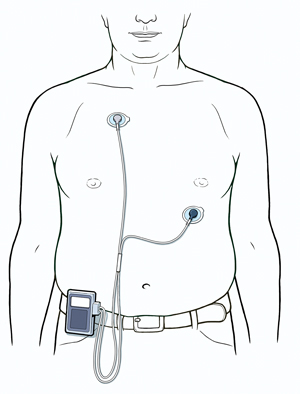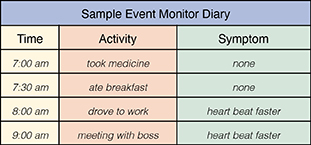A
B
C
D
E
F
G
H
I
J
K
L
M
N
O
P
Q
R
S
T
U
V
W
X
Y
Z
Topic IndexLibrary Index
Click a letter to see a list of conditions beginning with that letter.
Click 'Topic Index' to return to the index for the current topic.
Click 'Library Index' to return to the listing of all topics.
What Is Event Monitoring?
Event monitoring is a painless way to record your heartbeat. The monitor is a small electrocardiogram (ECG) device that you carry with you. It runs on batteries. The event monitor lets you record your heart rate and rhythm when you feel symptoms. Some event monitors can find and record irregular heart rhythms in real time, with or without symptoms. Some event monitoring records your heart rhythm for your healthcare provider to review at a later time. Some wireless monitors allow data to be sent to your provider's office for evaluation right away after an event is recorded. You may carry this monitor for a few days or weeks. You can get your heart monitor in a hospital, test center, or healthcare provider’s office.

When using an event monitor
Stay away from electric blankets, microwave ovens, electric toothbrushes or razors, magnets, metal detectors, and high-voltage areas such as power lines. They may affect the recording.
Your event monitor
Your healthcare provider will show you how to use your event monitor. Wear it as instructed all the time. Some event monitors use wires to record the heart rhythm. Newer event monitors use patches placed over the heart to record the heart rhythm. When you feel a symptom, push the button to start recording. (Some monitors start and stop recording automatically when an abnormal rhythm is detected.) Your provider will tell you how to do this. Be sure to keep a diary. Write down symptoms in detail. Include the time and date.
Event monitor diary
-
Write in the time of day for each entry you make.
-
Note each change in activity. This includes when you take medicine.
-
Note any symptoms you feel. Also write down what was going on around you when the symptoms occurred.

Online Medical Reviewer:
Ronald Karlin MD
Online Medical Reviewer:
Stacey Wojcik MBA BSN RN
Online Medical Reviewer:
Steven Kang MD
Date Last Reviewed:
3/1/2024
© 2000-2025 The StayWell Company, LLC. All rights reserved. This information is not intended as a substitute for professional medical care. Always follow your healthcare professional's instructions.